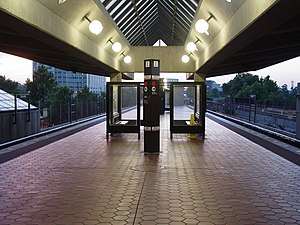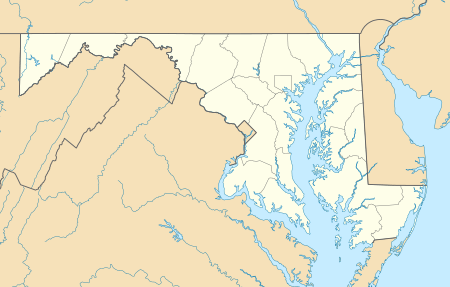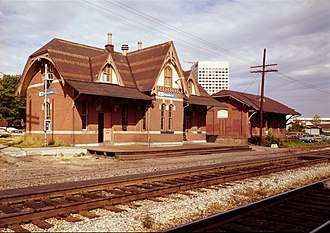Rockville station
Rockville station is an intermodal train station located in downtown Rockville, Maryland, United States. It is served by the Washington Metro Red Line, MARC Brunswick Line commuter trains, and Amtrak Capitol Limited intercity trains.
Rockville | |||||||||||||||||||||||||||||||
|---|---|---|---|---|---|---|---|---|---|---|---|---|---|---|---|---|---|---|---|---|---|---|---|---|---|---|---|---|---|---|---|
 Metro platform at Rockville station in 2004 | |||||||||||||||||||||||||||||||
| Location | 251 Hungerford Drive and 307 South Stonestreet Avenue, Rockville, Maryland | ||||||||||||||||||||||||||||||
| Coordinates | 39.084238°N 77.146125°W | ||||||||||||||||||||||||||||||
| Owned by | WMATA (station) CSX (tracks)[1] | ||||||||||||||||||||||||||||||
| Line(s) | CSX Metropolitan Subdivision WMATA A Route[2] | ||||||||||||||||||||||||||||||
| Platforms | 1 island platform (Red Line) 2 side platforms (Metropolitan Subdivision) | ||||||||||||||||||||||||||||||
| Tracks | 4 (2 for each service) | ||||||||||||||||||||||||||||||
| Connections | |||||||||||||||||||||||||||||||
| Construction | |||||||||||||||||||||||||||||||
| Parking | 524 spaces | ||||||||||||||||||||||||||||||
| Bicycle facilities | 69 racks, 40 lockers | ||||||||||||||||||||||||||||||
| Disabled access | Yes | ||||||||||||||||||||||||||||||
| Other information | |||||||||||||||||||||||||||||||
| Station code | Amtrak code: RKV | ||||||||||||||||||||||||||||||
| History | |||||||||||||||||||||||||||||||
| Opened | July 25, 1984 | ||||||||||||||||||||||||||||||
| Traffic | |||||||||||||||||||||||||||||||
| Passengers (2018) | 493 daily[3] (MARC) | ||||||||||||||||||||||||||||||
| Passengers (2016) | 4,087 daily [4] | ||||||||||||||||||||||||||||||
| Passengers (2017) | 5,605 annually[5] | ||||||||||||||||||||||||||||||
| Services | |||||||||||||||||||||||||||||||
| |||||||||||||||||||||||||||||||
| |||||||||||||||||||||||||||||||
Rockville Railroad Station | |||||||||||||||||||||||||||||||
  | |||||||||||||||||||||||||||||||
| Location | 98 Church Street, Rockville, Maryland | ||||||||||||||||||||||||||||||
| Coordinates | 39°4′58″N 77°8′42″W | ||||||||||||||||||||||||||||||
| Area | 1 acre (0.40 ha) | ||||||||||||||||||||||||||||||
| Built | 1873 | ||||||||||||||||||||||||||||||
| Architect | Ephraim Francis Baldwin | ||||||||||||||||||||||||||||||
| Architectural style | Queen Anne | ||||||||||||||||||||||||||||||
| NRHP reference No. | 74000961[6] | ||||||||||||||||||||||||||||||
| Added to NRHP | July 18, 1974 | ||||||||||||||||||||||||||||||
Rockville station opened in 1873 when the Baltimore and Ohio Railroad (B&O) built their Metropolitan Branch (now the CSX Metropolitan Subdivision). B&O intercity service served the station until 1971; the station continued to be served by commuter trains (which became the Brunswick Line in the 1980s). Amtrak service began in 1973 with the Blue Ridge, followed by the Shenandoah in 1976 and the Capitol Limited in 1981.
The station building, designed by Ephraim Francis Baldwin, was added to the National Register of Historic Places in 1974 as Rockville Railroad Station. It was moved slightly to the south in 1981 to make room for Metro construction. The modern Metro station opened on December 15, 1984.
History


The Baltimore and Ohio Railroad (B&O) opened its Metropolitan Branch on April 30, 1873, providing direct service to Washington, D.C. from the west.[7] Rockville station opened on May 19, 1873; the convenient access to Washington D.C. caused the town's population to more than double by 1890.[8] The station and the 1887-added fright house were designed by Ephraim Francis Baldwin, head architect of the B&O.[9][1]
The station building is among the few original Metropolitan Branch stations to survive. It is a brick Victorian picturesque structure with some Eastlake detailing, particularly in the roofline and gable decoration.[8] The station was listed on the National Register of Historic Places in 1974 as the Rockville Railroad Station.[6]
When Amtrak took over intercity passenger service on May 1, 1971, it did not include any service on the B&O; Rockville was served only by three daily commuter round trips to Brunswick and Martinsburg.[10]:67 Amtrak introduced the West Virginian (later renamed the Potomac Turbo and Potomac Special) in September 1971; it did not stop at Rockville.[10]:70 The Blue Ridge replaced the Potomac Special on May 5, 1973.[10]:68 The Blue Ridge was timed to serve as a commuter train; eastbound-only stops at Rockville and Gaithersburg were added on July 1, 1973.[10]:70 The Shenandoah, which stopped at Rockville in both directions, was added on October 31, 1976.[10]:68 The Blue Ridge began stopping at Rockville and Gaithersburg in both directions on weekends in 1977.[11] The Shenandoah was replaced by the Capitol Limited on October 1, 1981, at which time weekend service ended on the Blue Ridge[12][10]:70
Construction of a modern station for Amtrak, state-subsidized B&O commuter trains, and the new Washington Metro system began in 1981.[1] On March 2, 1981, the old station and freight house were moved about 50 metres (160 ft) to the south to make way for construction.[8] The new station opened on December 15, 1984 as part of a 7-mile (11 km), four-station extension of the Red Line from Grosvenor–Strathmore station to Shady Grove station.[13][14] In 1986, the Blue Ridge was taken over by MARC as part of the Brunswick Line—the state-subsidized ex-B&O commuter service—leaving the Capitol Limited as the only Amtrak service to Rockville.[15]
Station layout
Rockville station is located on an embankment south of Park Road and east of Hungerford Drive and downtown Rockville, with the Amtrak/MARC platforms just east of the Metro platform. Metro uses a single island platform between the two tracks of the Red Line, while Amtrak and MARC use two low-level side platforms flanking the two tracks of the CSX Metropolitan Subdivision.[1] A pedestrian underpass provides access to the platforms from parking lots, bus bays, and kiss and ride lots on the east and west sides of the station. A footbridge over Hungerford Drive connects the west side of the station to the Montgomery County office buildings.[1]
| 2F | Overpass | Pedestrian bridge over Rockville Pike |
| P Platform level |
Side platform | |
| Outbound | ← Brunswick Line toward Martinsburg or Frederick (Washington Grove) ← Capitol Limited toward Chicago (Harpers Ferry) | |
| Inbound | Brunswick Line toward Union Station (Garrett Park) → Capitol Limited toward Washington, D.C. (Terminus) → | |
| Side platform | ||
| Westbound | ← | |
| Island platform | ||
| Eastbound | | |
| G | Street level | West exit/entrance, parking, buses |
| M | Mezzanine | East exit/entrance, parking, buses; Red Line fare control |
References
- "Rockville, MD (RKV)". Great American Stations. Amtrak.
- "WMATA MANUAL OF DESIGN CRITERIA" (PDF). Washington Metropolitan Area Transit Authority. August 2014. pp. 8–40.
- "December 2018 MARC performance (for Nov 18) - Ridership" (PDF). Maryland Transportation Authority. Retrieved January 8, 2020.
- "Metrorail Average Weekday Passenger Boardings" (PDF). WMATA. Retrieved April 26, 2017.
- "Amtrak Fact Sheet, FY2017, State of Maryland" (PDF). Amtrak Government Affairs. November 2017. Retrieved January 10, 2018.
- "National Register Information System – Rockville Railroad Station (#74000961)". National Register of Historic Places. National Park Service. March 13, 2009.
- "The Metropolitan Railroad" (PDF). The Evening Star. Washington, D.C. April 30, 1873. p. 4.
- McGuckian, Eileen (May 1973). "National Register of Historic Places Registration: Rockville Railroad Station" (PDF). National Park Service. Includes November 1986 supplement.
- Soderberg, Susan C. (1998). The Met: A History of the Metropolitan Branch of the B&O Railroad, Its Stations and Towns. Germantown, MD: Germantown Historical Society. p. 38.
- Sanders, Craig (2006). Amtrak in the Heartland. Bloomington, Indiana: Indiana University Press. ISBN 978-0-253-34705-3.
- Amtrak National Train Timetables. Amtrak. May 1, 1977. p. 45 – via Museum of Railway Timetables.
- Amtrak National Train Timetables. Amtrak. October 25, 1981. p. 32 – via Museum of Railway Timetables.
- "Metro Facts 2017" (PDF). Washington Metropolitan Area Transit Authority. 2017. p. 3. Archived from the original (PDF) on January 24, 2018.
- Lynton, Stephen J. (December 10, 1984). "Metro Makes a Long Leap". Washington Post.
- West Virginia Department of Transportation, State Rail Authority (March 12, 2013). "West Virginia State Rail Plan: Maryland Area Regional Commuter Service". p. 2. Archived from the original on October 7, 2016.
External links
| Wikimedia Commons has media related to Rockville station. |
- Rockville, MD – Amtrak
- Rockville, MD (RKV) (Amtrak's Great American Stations)
- USA Rail Guide: Rockville Amtrak-MARC-Washington Metro Station
- Rockville Railroad Station, Montgomery County, Inventory No.: M: 26-12-1, including photo in 2003, at Maryland Historical Trust website
%2C_July_2012.jpg)

